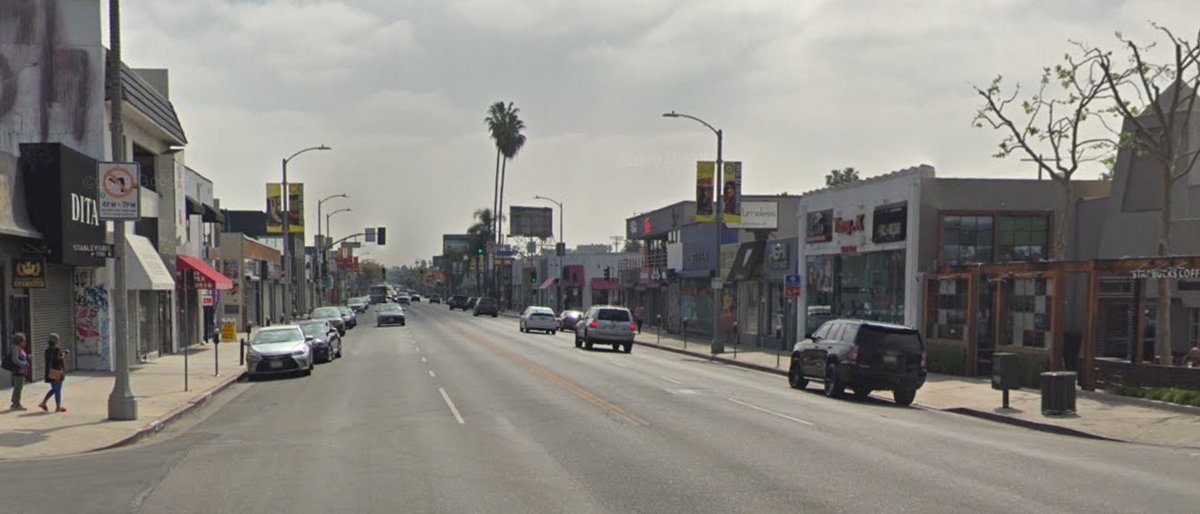Paul Koretz is not my councilmember, but yesterday he killed a transformational project - #UpliftMelrose - that would have saved lives. Koretz rationalized this action with a series of justifications that warrant a response. (thread/14)
Koretz shares "concerns have been expressed by our public safety departments."
While public safety share concerns about room to speed cars down the road or u-turn ladder trucks, what percent of their calls are for traffic violence that could be reduced with this project? (2/14)
While public safety share concerns about room to speed cars down the road or u-turn ladder trucks, what percent of their calls are for traffic violence that could be reduced with this project? (2/14)
He says he's "even driven down Melrose one more time..."
How about walking or riding a bike along it? Or waiting at a bus stop like this? Maybe if he sat on that green bench and waited in the blazing sun for a bus on a 110-degree day he'd have a new perspective. (3/14)
How about walking or riding a bike along it? Or waiting at a bus stop like this? Maybe if he sat on that green bench and waited in the blazing sun for a bus on a 110-degree day he'd have a new perspective. (3/14)
He doesn't "believe that a road diet reducing a street with over 30,000 cars a day... has been done anywhere in the country."
So... LADOT's own car counts correlate to 20K-22K cars a day, which is actually quite rational for a road diet. (4/14)
https://navigatela.lacity.org/dot/traffic_data/manual_counts/13099_FAIRFAX.MELROSE09.pdf
So... LADOT's own car counts correlate to 20K-22K cars a day, which is actually quite rational for a road diet. (4/14)
https://navigatela.lacity.org/dot/traffic_data/manual_counts/13099_FAIRFAX.MELROSE09.pdf
Even at 30K+ cars/day road diets HAVE been done in the country, which a simple Google search answers. And assuming LADOT's counts are accurate, Melrose handles fewer cars than Rowena, which got a road diet 7 years ago, and has likely saved lives. (5/14) https://www.keeprowenasafe.com/
He continues, "Melrose is used to get to and from work, to and from school, to and from hospitals..."
Okay, and those trips are probably fewer than half of all the cars on Melrose. A good number are just circling looking for parking! (6/14) https://transfersmagazine.org/magazine-article/how-much-traffic-is-cruising-for-parking/
Okay, and those trips are probably fewer than half of all the cars on Melrose. A good number are just circling looking for parking! (6/14) https://transfersmagazine.org/magazine-article/how-much-traffic-is-cruising-for-parking/
He asserts "We can also expect a massive bottleneck where Melrose goes from two lanes to one."
If he drove along Melrose east of Western, he would know it already goes from two lanes to one, and car counts are the same there as "Uplift Melrose." (7/14)
https://navigatela.lacity.org/dot/traffic_data/manual_counts/18422_HOBMEL03.pdf
If he drove along Melrose east of Western, he would know it already goes from two lanes to one, and car counts are the same there as "Uplift Melrose." (7/14)
https://navigatela.lacity.org/dot/traffic_data/manual_counts/18422_HOBMEL03.pdf
Koretz doesn't "believe that this action will get anyone out of their cars, except for immediate neighbors on short trips who could walk or bicycle."
What about the safety of those walking/bicycling? Or the 47% of trips in LA already under 3 miles? (8/14)
https://planning.lacity.org/odocument/523f2a95-9d72-41d7-aba5-1972f84c1d36/Mobility_Plan_2035.pdf
What about the safety of those walking/bicycling? Or the 47% of trips in LA already under 3 miles? (8/14)
https://planning.lacity.org/odocument/523f2a95-9d72-41d7-aba5-1972f84c1d36/Mobility_Plan_2035.pdf
He goes on, "It is likely to raise rents when it is completed."
So, will this make Melrose untenable or more desirable? Which is it? Still, he's probably referring here to research showing that road diets increase economic activity. (9/14) https://www.treehugger.com/study-shows-people-who-walk-and-bike-to-main-streets-spend-more-4855935
So, will this make Melrose untenable or more desirable? Which is it? Still, he's probably referring here to research showing that road diets increase economic activity. (9/14) https://www.treehugger.com/study-shows-people-who-walk-and-bike-to-main-streets-spend-more-4855935
Again on public safety: "The bottleneck that the reduction of lanes would create... are likely to greatly impede the ability of [emergency services] to respond."
Let's let the Federal Highway Administration respond to this: (10/14)
https://safety.fhwa.dot.gov/road_diets/resources/fhwasa16074/
Let's let the Federal Highway Administration respond to this: (10/14)
https://safety.fhwa.dot.gov/road_diets/resources/fhwasa16074/
He goes on, the "lane reduction would impact the ability to keep Melrose open should there be a requirement for an emergency response."
It sounds like he's saying his chief concern when someone is hit on Melrose today is that it be reopened as swiftly as possible. (11/14)
It sounds like he's saying his chief concern when someone is hit on Melrose today is that it be reopened as swiftly as possible. (11/14)
Koretz concludes "I don't believe the public safety and traffic concerns can be mitigated..."
Again, evidence already demonstrates the efficacy of the proposed project elements and there are still years to be able to mitigate any real issues that might arise. (12/14)
Again, evidence already demonstrates the efficacy of the proposed project elements and there are still years to be able to mitigate any real issues that might arise. (12/14)
He concludes, "I will not support moving it forward."
The project itself wouldn't even begin construction until a year or two after he leaves office. So, what he's really saying is that he won't let his successor help move this forward. (13/14)
The project itself wouldn't even begin construction until a year or two after he leaves office. So, what he's really saying is that he won't let his successor help move this forward. (13/14)
Paul Koretz is now running for City Controller, which is an office tasked with providing an independent, honest accounting of City finances. Given his reliance on his beliefs over evidence and data, his latest electoral venture deserves a great deal of scrutiny. (14/end)

 Read on Twitter
Read on Twitter











